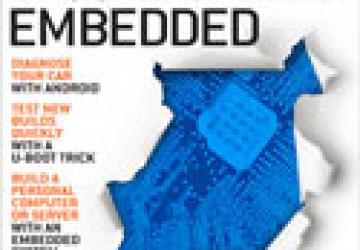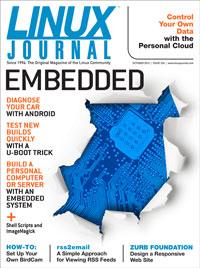October 2013 Issue of Linux Journal: Embedded

 My favorite scene from The Karate Kid (the original from 1984, sorry, I'm old) is when Mr Miyagi stops the Cobra Kai sensei, John Kreese, from beating up his defeated student. Miyagi is a small, feeble-looking old man, and he has no need to prove to anyone that he's an awesome warrior. Linux is much the same: awesome and unassuming. Linux is slowly but surely taking over the world, embedded into cell phones, televisions, wristwatches and server rooms. Because Linux itself isn't a commercial entity, it doesn't need to be flashy, and it doesn't need to brag. When it comes to embedded systems, Linux is "honking the nose" of proprietary alternatives, just like Mr Miyagi does to the bully.
My favorite scene from The Karate Kid (the original from 1984, sorry, I'm old) is when Mr Miyagi stops the Cobra Kai sensei, John Kreese, from beating up his defeated student. Miyagi is a small, feeble-looking old man, and he has no need to prove to anyone that he's an awesome warrior. Linux is much the same: awesome and unassuming. Linux is slowly but surely taking over the world, embedded into cell phones, televisions, wristwatches and server rooms. Because Linux itself isn't a commercial entity, it doesn't need to be flashy, and it doesn't need to brag. When it comes to embedded systems, Linux is "honking the nose" of proprietary alternatives, just like Mr Miyagi does to the bully.
We start out our Embedded issue with Reuven M. Lerner's column. This month, Reuven explores an alternative to the extremely popular Twitter Bootstrap. Zurb Foundation may sound like a character from Starcraft, but in fact, it's a competitor to Twitter Bootstrap that is worth a look. Kyle Rankin takes the path less traveled as well this month with his solution to the Google Reader shutdown. One of the things I love about Linux is that there's no single way to do anything. While I want a bookmark to take me from RSS site to RSS site, Kyle shows us to have articles delivered via e-mail. If that sounds interesting to you, check out his column this month for instructions on how he does it.
Dave Taylor and I have a little crossover with our columns this month, which is completely coincidental, but very aptly timed. Dave explores the power of the ImageMagick suite of tools used in scripting. I follow later in the magazine with my column describing my homemade streaming Webcam of "BirdTopia", or "Backyard" as others refer to it. I use some ImageMagick tools to manipulate the images pulled from my cell phones, all from scripts on my Linux server. I've enjoyed creating my BirdCam setup more than most of my Linux projects, and I hope it inspires you to try something similar!
The truly embedded portion of this issue starts with Bill Childers and his article on interfacing with your vehicle's OBD system. Using Android and a fancy dongle, Bill explains how to get diagnostic information directly from your car! If your "Check Engine" light suddenly pops on, but gives no reason as to why, Bill's article will be extremely helpful. Ronald Kurniawan goes one step deeper and shows how to use an $80 embedded system from Olimex to create a desktop system, or even a complete server. Proving there's more to the tiny embedded world than just Raspberry Pi devices, Ronald walks through the entire process for getting a system running.
Most new embedded systems take advantage of the U-Boot system for starting up. Bharath Bhushan Lohray covers U-Boot and some of its features, along with a few tricks. Whether you need to boot your embedded device from an SD card, a USB stick or even over TFTP, U-Boot can make modifications as simple as a device reboot. Bharath walks through the process and gives configuration examples. And finally, T.Rob talks about the future of the Cloud—specifically, the Personal Cloud. While the fluid size and burstable expansion of cloud computing has revolutionized the way we think about server rooms, it also has moved sensitive data out of our personal control. How do we deal with managing our personal, private data in a world focusing on selling services? T.Rob explores that and gives us a lot to consider.
Much like "cloud" computing, "embedded" computing has a fairly flexible definition. One thing is certain, however, and that is that Linux is perfect for the embedded world, however you define it. With its breathtaking variety of hardware support and unassuming happiness living behind the scenes, the embedded market may be the vehicle Linux finally uses to take over the world. Year of the desktop? Pshaw, more like year of "the everything else", with a little desktop on the side! Although Linux may not have the marketing campaign, or ad campaigns of the proprietary alternatives, much like Mr Miyagi, it doesn't need it. Just do the job, do it well, and the rest will fall into place. We hope you enjoy this issue (very likely reading it on your embedded device); we certainly enjoyed putting it together!
Available to Subscribers: October 1










